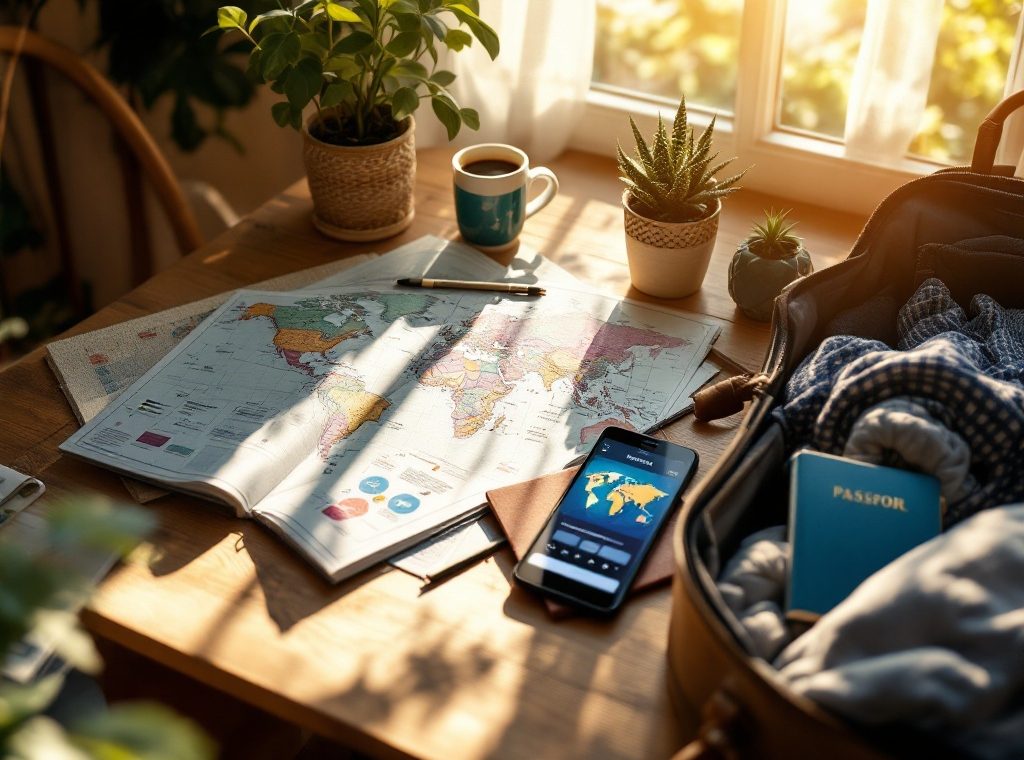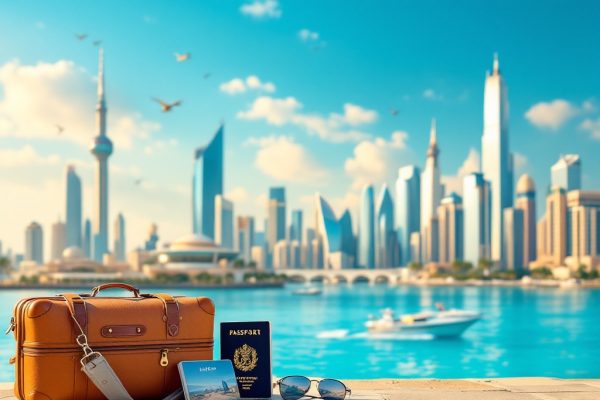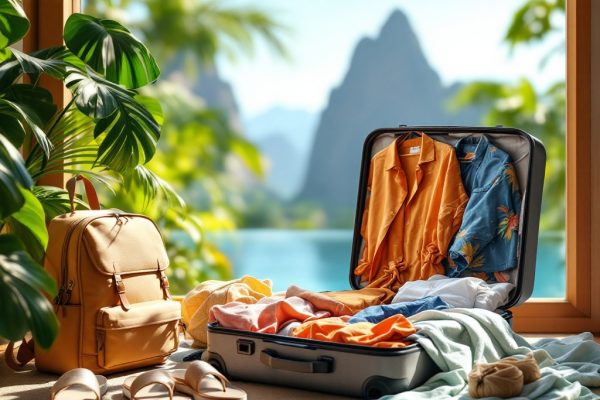Travel Tips and Tricks: All You Need to Know
Dreaming of your first big adventure? Traveling can be exciting, but planning is key. This guide offers essential tips for novice travelers, covering everything from passport checks and itinerary planning to smart packing and budgeting. Learn how to research your destination, navigate transportation, stay safe, and even save money with points and miles. Prepare for a smooth and enriching journey – start planning your dream trip today!
Important information
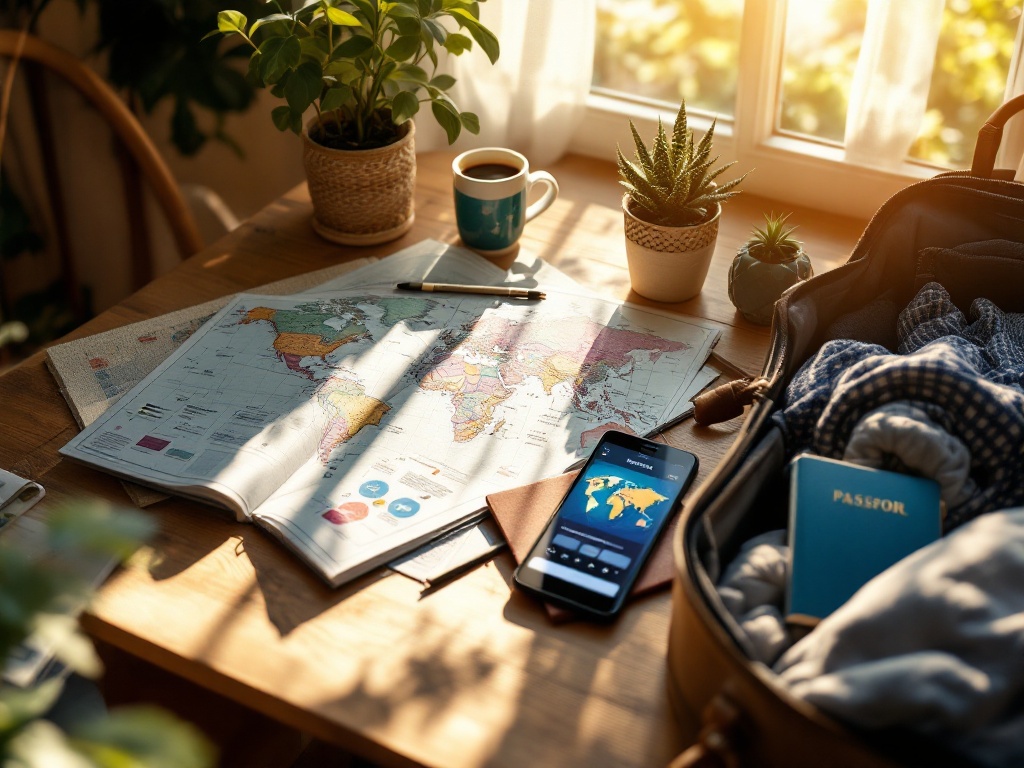
- Check your passport’s validity and expiration date well before your trip.
- Plan a detailed itinerary, research local customs, and be flexible, as unexpected changes may occur.
- Pack light, make copies of important documents, and research transportation options in advance.
- Set a travel budget, compare currency exchange rates, and inform your bank of your travel plans.
- Get travel insurance, research health guidelines for your destination, and pre-book airport transportation.
Travel Tips for Beginners: Getting Started
Planning your first adventure? Start with these essential steps:
Passport Check: Ensure your passport is valid and check the expiration date.
Itinerary Planning: Create a detailed itinerary to stay organized and maximize your time. Research local customs to ensure respectful interactions.
Smart Packing: Pack light for easier travel. Copy important documents like your passport and store them separately from the originals.
Transportation Research: Research transportation options in advance to navigate your destination effectively.
Budgeting and Flexibility: Pre-trip budgeting is crucial to account for unexpected expenses. Flexibility is key to a smooth journey; be prepared to adjust your plans if needed.
Safety First: Prioritize your safety by staying aware of your surroundings and securing your belongings. Research your destination’s safety guidelines and keep emergency contacts readily accessible.
Pre-Trip Essentials:
- Valid passport,
- Detailed itinerary,
- Copies of important documents.
During Your Trip:
- Stay aware of your surroundings,
- Secure your belongings,
- Be adaptable to unexpected situations.
Importance of Travel Tips for Novice Travelers
Smart travel tips can prevent common mistakes for new travelers, saving both time and money. Planning ahead ensures a smoother, more enjoyable first trip.
Research your destination. Learn about its customs, language, and attractions.
Create a packing list of essentials.
Familiarize yourself with the local transportation system and currency.
Copy important documents like your passport and travel insurance. It’s highly recommended.
Learn even a few basic phrases in the local language. It can be incredibly helpful.
Planning Your First Trip
Kick.
Efficient Trip Planning Strategies
Thorough destination research is essential. Immerse yourself in the local culture, customs, laws, and even try learning some basic phrases.
A well-crafted itinerary, encompassing activities, transportation, and budget, maximizes your time and resources.
Beyond logistics, ensure a smooth and safe trip by checking visa requirements, getting recommended vaccinations, and reviewing local advisories.
Booking accommodations early often secures better prices and availability, particularly during peak season. Consider location, amenities, and reviews—a hotel near public transport can be invaluable.
Reviews offer valuable insights, ultimately contributing to a more enriching travel experience.
Researching Your Travel Destination
Enrich your travel experience by creating a list of must-see attractions and activities before you depart. Thorough research will significantly improve your travel adventure.
Understanding local customs is essential for a respectful and immersive travel experience. Learning about these traditions not only fosters cultural connection but also helps you avoid unintentional cultural faux pas.
Creating a Comprehensive Travel Itinerary
Planning a trip? A well-crafted itinerary is essential, especially for first-time travelers. It covers everything from transportation and accommodation to exciting activities. A solid plan streamlines your trip, maximizing enjoyment and efficiency. It helps you stay organized, manage your time effectively, and stick to your budget. A clear daily schedule reduces stress by minimizing the unknown, contributing to a more relaxed and fulfilling travel experience.
Booking Accommodations Wisely
To secure the perfect accommodations, weigh three crucial elements: location, amenities, and cost. Advance bookings are always recommended, especially during peak season. For budget travelers, hostels, guesthouses, and vacation rentals provide excellent hotel alternatives. Comparing prices across various platforms ensures the best possible deal.
Packing Tips and Tricks
Plan your packing based on your trip’s length, planned activities, and the expected weather. Include essentials like clothing, toiletries, electronics, and any necessary medications.
Choose durable, yet lightweight luggage to protect your belongings and avoid extra baggage fees. Pack light by selecting versatile clothing items that can be mixed and matched.
Roll your clothes instead of folding to save space and minimize wrinkles. Use packing cubes to organize and compress clothing within your luggage.
Separate items into categories, such as tops, bottoms, and toiletries. This makes finding things easier without unpacking everything.
Creating a Practical Packing List
A well-crafted packing list is a traveler’s best friend. It ensures you have everything needed for a smooth trip, from clothing and toiletries to crucial travel documents. This preparation prevents forgotten essentials and streamlines the packing process. To pack effectively, consider your destination’s weather and planned activities. Hiking trips demand sturdy boots, while beach getaways call for swimwear. Remember to pack these essential items:
- passport,
- any necessary medications,
- appropriate clothing for the weather,
- toiletries.
Smart packing saves time and reduces travel stress.
Choosing Durable Luggage and Packing Light
Invest in durable luggage, as its longevity outweighs superficial aesthetics.
Pack light for effortless mobility and reduced stress.
Prioritize versatile clothing items that can be mixed and matched, minimizing packing volume.
Rolling clothes saves space and keeps them wrinkle-free.
Packing cubes are invaluable for organization and space maximization.
Using Packing Cubes for Organization
Packing cubes are a traveler’s best friend, transforming chaotic luggage into an organized oasis. They maximize space and make finding items a breeze. By separating clothes, toiletries, and other essentials, you’ll say goodbye to messy bags. The cubes’ compression capabilities create extra room. Their varied sizes and shapes accommodate everything from shoes to small accessories, fitting seamlessly into any luggage type. Packing and unpacking become effortless, ultimately leading to more efficient travel and a streamlined trip. Here are some key benefits of using packing cubes:
- Superior Organization: effortlessly categorize clothing, toiletries, and other travel essentials, eliminating the frustration of rummaging through a messy suitcase.
- Space Maximization: compress belongings to create significantly more space, allowing you to pack more efficiently and potentially avoid checked baggage fees.
- Versatile Compatibility: designed to fit seamlessly into various luggage types and sizes, maximizing their utility and ensuring a perfect fit every time.
- Effortless Packing and Unpacking: streamline the packing and unpacking process, saving you valuable time and reducing travel stress.
- Enhanced Travel Experience: by promoting organization and efficiency, packing cubes contribute to a smoother, more enjoyable travel experience overall.
Travel Essentials: Must-Have Items
Safeguard essential travel documents. Keep passports, visas, driver’s license, and travel insurance close.
Make photocopies of important documents. Store them separately from the originals for added security.
Create digital copies of your documents. Store them securely online for another layer of protection.
Remember your electronics and necessary adapters. Check your destination’s outlet requirements beforehand.
Consider using a local SIM card. This can significantly reduce communication costs.
Bring a portable charger. This will ensure your devices stay powered throughout your travels.
Important Documents and Photocopies
Before traveling, photocopy essential documents such as your passport, visa, driver’s license, and travel insurance policy. Store these copies separately from the originals. This precaution ensures you have backup documentation if your originals are lost or stolen, minimizing potential difficulties during your trip.
Adapters, SIM Cards, and Portable Chargers
Prepare for your trip by grabbing these essential items:
- travel adapters,
- a local SIM card,
- a portable charger.
This ensures immediate power and connectivity, saving you valuable time and hassle.
Safe and Smooth Travel: What to Consider
Prepare for your trip with these essential steps:
Protect yourself with travel insurance. Secure your trip against unexpected events such as medical emergencies, trip cancellations, or lost baggage.
Research health guidelines for your destination. Check recommended vaccinations and entry requirements, including visas, passport validity, and health declarations.
Pre-book your airport transfer. Arrange transportation to your hotel in advance, whether by private car, taxi, or public transport, to ensure a hassle-free arrival.
Travel Insurance and Health Precautions
Travel insurance acts as a safety net, protecting you from unforeseen issues like medical emergencies, trip cancellations, and lost luggage. Prioritizing your health is crucial, so research necessary vaccinations and recommended medications for your destination. Additionally, stay informed about COVID-19 restrictions, including potential testing and quarantine requirements. Here’s a breakdown to help you prepare:
Secure Travel Insurance. Obtain comprehensive travel insurance that covers medical emergencies, trip cancellations, and lost luggage.
Prioritize Health Preparations. Research necessary vaccinations and recommended medications for your destination.
Stay Informed About COVID-19. Stay updated on COVID-19 restrictions, including potential testing and quarantine requirements.
Staying Informed on Entry Requirements
Before your trip, research visa requirements, recommended vaccinations, and any specific regulations or restrictions for your destination. Consult travel advisories from your government and other reputable sources for up-to-date safety and security information, including potential risks. Stay informed and travel safely.
Transportation Plans Upon Arrival
Plan your ground transportation before you arrive. You can choose from several options: airport shuttles, taxis, or ride-sharing services. For travelers on a budget, public transportation like buses and trains is a cost-effective choice. If you want to explore more extensively, consider renting a car. Booking your transportation in advance can make your trip smoother and potentially save you money. Make sure you have your accommodation address readily available, written in English and the local language if needed.
Financial Preparedness for Travelers
Planning your travel budget is crucial for a successful trip. Before you depart, research the costs of accommodation, activities, and transportation at your destination. Establish a realistic daily spending limit and track your expenses throughout your trip. Budgeting apps can help simplify this process.
Currency Exchange
Compare exchange rates from various sources like banks, exchange bureaus, and airport kiosks to secure the best deals. Consider using no-fee cards, especially those without foreign transaction or ATM fees, to minimize charges.
Bank Notifications
Notify your bank and credit card companies about your travel dates and destinations to prevent any card blocks. This will ensure smooth transactions during your trip and avoid any inconvenience.
Budget Planning and Currency Exchange
Before traveling, research your destination’s cost of living to build a realistic budget. Compare exchange rates and use reputable currency exchange services to minimize fees. For international transactions, consider no-fee bank and credit cards.
Using No-Fee Bank and Credit Cards
Travel smarter with no-fee credit and bank cards. These cards eliminate foreign transaction fees, often as high as 3% per purchase, maximizing your spending power abroad. They also simplify budgeting by removing unpredictable charges, giving you greater control and convenience over your travel finances.
Technology and Travel: Staying Connected
Navigation apps offer real-time directions and can pinpoint points of interest, find transportation, and help you explore new areas. Some popular choices include Citymapper, Google Maps, and Maps.me. Download offline maps within these apps before your trip to ensure navigation capabilities even without internet access.
Stay Connected and Secure with a VPN
A VPN encrypts your internet traffic and masks your IP address, bolstering your online security, especially on public Wi-Fi. Popular VPN services include ExpressVPN, NordVPN, and Skyroam Solis.
Portable Wi-Fi Hotspots
Portable Wi-Fi hotspots create private networks, providing secure internet access for multiple devices. This ensures both data privacy and consistent connectivity during your travels.
Travel Apps and Offline Maps
Travel apps are incredibly helpful tools for navigating unfamiliar territories, booking accommodations, and even translating languages. A key feature is offline maps, providing directions and location information even without internet access. This is essential for travelers exploring new places. Some apps that offer this offline functionality are Citymapper and Google Maps, allowing users to explore with confidence, even when disconnected.
Using a VPN and Portable Wi-Fi Hotspot
Public Wi-Fi poses security risks, but a VPN creates a secure connection to protect your data. Consider using a VPN for online security.
A portable Wi-Fi hotspot offers private, reliable internet access, especially useful in areas with limited Wi-Fi. A portable Wi-Fi hotspot ensures consistent connectivity.
Combining a VPN and a portable Wi-Fi hotspot is a powerful solution, ensuring both security and consistent connectivity while traveling. When selecting a VPN provider, consider factors like speed and server locations to maximize your online security and browsing experience.
Maximizing Your Travel Experience
Immerse yourself in the local culture by:
- sampling the regional cuisine,
- participating in time-honored traditions,
- learning a few basic phrases.
These simple steps can significantly enrich your travel experiences.
A well-planned itinerary balances structured activities with unplanned discoveries.
Free walking tours are an excellent way to discover hidden gems and save money.
Utilize points and miles to drastically reduce travel costs.
Redeem them for flights and accommodations, or use them to offset other expenses—it’s a smart way to explore more of the world.
Cultural Immersion and Local Customs
Showing respect for local customs demonstrates genuine interest. Learning basic phrases enhances communication and expresses regard for the culture. Sampling local cuisine provides a delicious glimpse into their traditions. Immersing yourself in local events and festivals deepens your cultural experience. Visiting historical sites and museums adds depth to your understanding of the region’s heritage. These simple acts showcase cultural sensitivity and enrich your travel adventures.
- Respect local customs.
- Learn basic phrases.
- Sample local cuisine.
- Participate in local events.
- Visit historical sites and museums.
Making the Most of Your Itinerary
Research must-see attractions and local events.
Blend structured activities with free time for spontaneous discoveries.
Factor in travel time between destinations.
Allocate sufficient time for each experience.
A thoughtful itinerary will maximize your trip and ensure a fulfilling adventure.
Saving Money with Points and Miles
Use your points and miles for travel savings, especially on flights and accommodations, to significantly reduce expenses.
